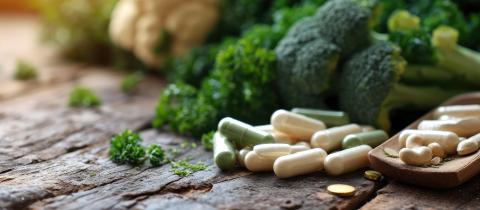
Bones are one of the body’s most important structural organs. Not only do they allow us to move and function, but they also act as storage for essential nutrients. Our bones begin to deteriorate over time, however, for a variety of reasons including aging, medical diagnoses, nutrition, or the use of certain medications. Supporting bone health is important throughout all life stages, and the foods you eat can play a significant role.
Nutrients Essential for Bone Health:
- Vitamin C
- Vitamin C supports bone health by promoting collagen production, which is a vital component of the bony matrix.
- Foods rich in Vitamin C:
- Red and green peppers
- Oranges and grapefruits
- Broccoli and Brussels sprouts
- Strawberries, papaya, and pineapples
- Calcium
- Calcium is the most abundant mineral in our bones. Since the body cannot produce calcium, sufficient dietary intake is essential for maintaining strong and healthy bones. When dietary calcium is inadequate, the body draws calcium from the bones, leading to deterioration over time.
- Important note: Calcium absorption is impaired in foods high in oxalates, such as spinach, rhubarb, and beet greens. While these foods are nutrient-rich, because they impede the absorption of calcium, they should not be relied on as primary calcium sources. Important note: Calcium absorption is impaired in foods high in oxalates, such as spinach, rhubarb, and beet greens. While these foods are nutrient-rich, they should not be relied upon as primary calcium sources.
- Foods rich in Calcium:
- Dairy products
- Canned sardines and salmon (with bones)
- Collard greens, turnip greens, kale, and mustard greens
- Chinese cabbage, okra, broccoli, and dandelion greens
- Vitamin K
- Vitamin K plays a crucial role in bone health by promoting the production of healthy bone cells and reducing bone deterioration. It also enhances calcium deposition into bones, improving their overall integrity.
- Foods rich in Vitamin K:
- Prunes
- Dark leafy vegetables (e.g., kale, collard greens, spinach, mustard greens, turnip greens, Brussels sprouts)
- Dietary Precautions for Bone Health
Arachidonic Acid
- Arachidonic acid, an omega-6 polyunsaturated fatty acid found in meat (e.g., pork, chicken, fish), may negatively impact bone health by promoting bone breakdown and reducing bone density. Emerging research suggests that high blood concentrations of arachidonic acid are linked to lower bone mass.
Phytate Content
- Phytates, a type of phytochemical in plants, can interfere with calcium absorption. High-phytate foods include seeds, nuts, legumes, and wheat bran. To mitigate this, soak dried beans in water for several hours before cooking them in fresh water.
Salty/Processed Foods
- High-salt foods can cause calcium loss in the body, ultimately leading to bone loss. Consider the sodium content of your meals and limit processed food consumption.
Take-Aways
Bone health is vital to overall well-being and longevity. By including bone-supporting nutrients like Vitamin C, calcium, and Vitamin K in your diet while being mindful of dietary precautions, you can support strong, healthy bones throughout your life. Small, consistent dietary changes can make a big difference in maintaining your skeletal health—start nourishing your bones today!
Author: Christina Tersigni, CCNM Integrative Cancer Clinic Intern
Please note that the information provided in this blog post is for informational purposes only and should not be considered as medical advice. It is essential to consult with your healthcare provider or a qualified professional before making any healthcare decisions or taking any actions based on the information presented here.